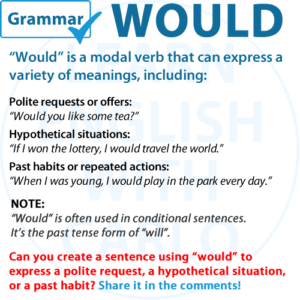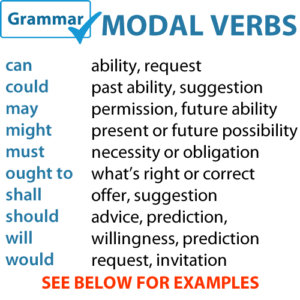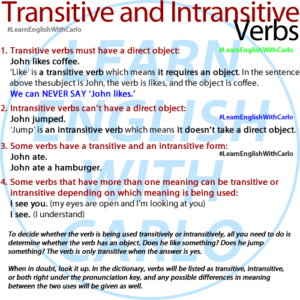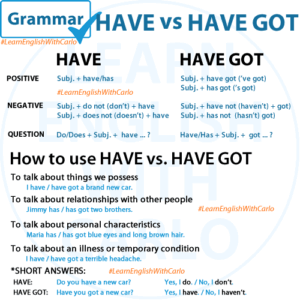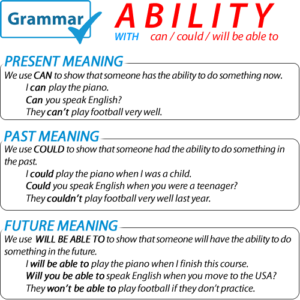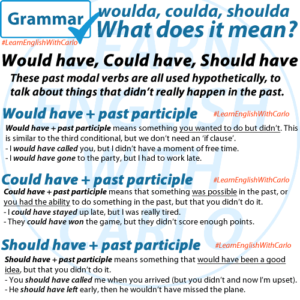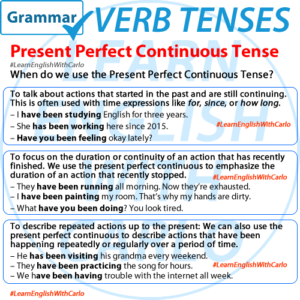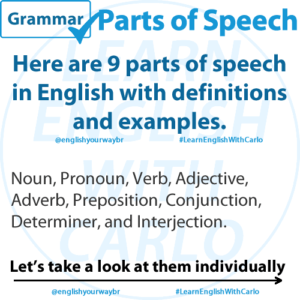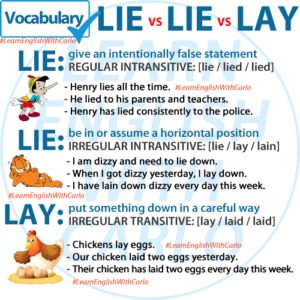Modal verbs play a crucial role in shaping the meaning and tone of our language. Among these, “would” stands out as a versatile tool with a myriad of uses and implications. In this blog post, we’ll delve into the depths of “would”, exploring its various meanings, functions, and usage in everyday language. Understanding “Would”: At …
Category: VERBS
Permanent link to this article: https://englishyourway.com.br/mastering-the-modal-understanding-the-versatility-of-would/
Nov 15
GRAMMAR – Modal Verbs
What Are Modal Verbs? Modal verbs are auxiliary (helping) verbs that express possibility, necessity, ability, permission, and other attitudes toward the action of the main verb. Unlike regular verbs, modal verbs do not change form based on the subject (e.g., “I can,” “he can”). They are always followed by the base form of the main …
Permanent link to this article: https://englishyourway.com.br/grammar-modal-verbs/
Oct 27
Transitive and Intransitive Verbs Explained
Verbs are the heart of every sentence. They tell us what’s happening — what the subject does or is. But did you know that some verbs need an object, while others stand alone? That’s where transitive and intransitive verbs come in. Understanding the difference between them helps you build clear, grammatically correct sentences — and …
Permanent link to this article: https://englishyourway.com.br/transitive-and-intransitive-verbs-in-english-grammar/
Oct 26
HAVE & HAVE GOT
When we talk about possession, relationships, illnesses, or characteristics, English gives us two ways to express the same idea:👉 HAVE and HAVE GOT Both mean the same thing, but they’re used slightly differently in everyday English. 🧩 1. Meaning and Usage Both HAVE and HAVE GOT are used to talk about things we own, relationships, …
Permanent link to this article: https://englishyourway.com.br/have-vs-have-got-in-english-grammar/
Oct 08
Understanding Ability in English: CAN, COULD, and WILL BE ABLE TO
In English, we use different forms to express someone’s ability to do something, whether in the present, past, or future. Let’s explore how CAN, COULD, and WILL BE ABLE TO are used to talk about ability. 1. CAN – Ability in the Present We use CAN to show that someone has the ability to do …
Permanent link to this article: https://englishyourway.com.br/ability-can-could-will-be-able-to/
Sep 18
Woulda, Coulda, Shoulda – What Does It Mean?
You may have heard native English speakers use phrases like woulda, coulda, or shoulda. But what do they mean? These are informal, spoken forms of would have, could have, and should have. These past modal verbs are used to talk about things that didn’t happen, but that we imagine or wish had been different. Let’s …
Permanent link to this article: https://englishyourway.com.br/woulda-coulda-shoulda/
Sep 15
The Difference Between “Used to” and “Would”
When talking about past habits or repeated actions, learners of English often encounter two phrases: “used to” and “would.” While these two expressions have similarities, they are not interchangeable in every context. Let’s explore their meanings, uses, and differences in detail. What Does “Used to” Mean? “Used to” refers to habits, actions, or states that …
Permanent link to this article: https://englishyourway.com.br/used-to-vs-would/
Jul 12
Present Perfect vs. Present Perfect Continuous
The Present Perfect and Present Perfect Continuous tenses can sometimes be used interchangeably, but they often emphasize different aspects of an action. Here’s a breakdown of when they are the same and when they are different: When the Present Perfect and Present Perfect Continuous Are the Same: Both tenses can be used to talk about …
Permanent link to this article: https://englishyourway.com.br/present-perfect-vs-present-perfect-continuous/
Jun 04
Parts of Speech
Here are 9 parts of speech in English with definitions and examples. NOUN A noun is a word used to identify a person, place, thing, or idea. Nouns are the basic building blocks of sentences and are essential for communication in any language. Examples of nouns include “dog,” “car,” “teacher,” “city,” and “happiness.” Nouns can …
Permanent link to this article: https://englishyourway.com.br/partsofspeech/
May 04
Lie vs. Lie vs. Lay: Understanding the Differences
English can be tricky, especially when it comes to words that sound the same but have different meanings and uses. A common source of confusion is the difference between “lie,” “lie,” and “lay.” These three words are often mixed up, but understanding their meanings and how they are used can help you use them correctly. …
Permanent link to this article: https://englishyourway.com.br/lie-vs-lie-vs-lay-understanding-the-differences/
- 1
- 2

